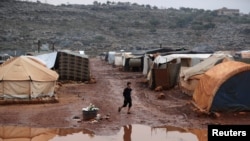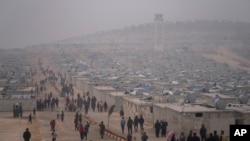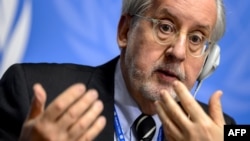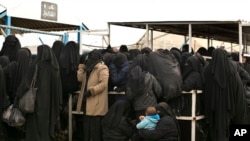Human rights experts warn Syria’s people are trapped in a society riven by impunity, lawlessness and fragmentation after 13 years of conflict with no end in sight.
In its latest update to the United Nations Human Rights Council, the three-member Independent International Commission of Inquiry on Syria presented a blistering account of the grim reality facing civilians in a country “with a crumbling economy and a devastating humanitarian situation.”
“For more than a decade, we have documented extensive human rights violations and war crimes across the Syrian territory by all parties to the conflict,” commission chair Paulo Sergio Pinheiro told the council Wednesday, noting that throughout the prolonged conflict “there has been a consistent disregard for the lives and well-being of the Syrian people with no end in sight.”
He said appalling cycles of violence continue, as do massacres that “invoke the atrocities committed with impunity during the conflict,” including during the darkest days of Daesh or Islamic State rule.
Syria’s ambassador to the U.N. in Geneva, Haydar Ali Ahmad, rejected the findings, calling details of the commission’s work “detached from reality.”
The conflict, which began in March of 2011, has taken a heavy toll on the population. The U.N. says more than 350,000 civilians have been killed and more than 13.5 million people — over 60% of the population — have been displaced. That includes 6.8 million people inside Syria and 5.4 million as refugees in neighboring countries.
The report says 155,000 Syrians have been detained or forcibly disappeared, a phenomenon that, according to the commission, persists to this day. The report accuses predatory security forces and militias of overseeing criminal fiefdoms while “extorting monetary gain from civilians.”
“Incommunicado detention and enforced disappearances continue, with families of those unlawfully detained often compelled to pay large sums of money to try to obtain information on the fate of their loved ones,” Pinheiro said.
The report describes a thriving drug trafficking and smuggling trade in Syria involving both pro- and anti-government factions causing further insecurity.
The commission says unlawful occupation, confiscation and destruction of the homes, land and property of internally displaced people and refugees continue in a “slow-motion” but steady fashion, thus “further eroding their rights and rendering the prospects of their return home more elusive every day.”
While the fierce battles of previous years have generally subsided, there continue to be sporadic clashes throughout the country with devastating results.
“Six foreign armies are engaged militarily in the country,” Pinheiro said. “Adding further complexity to this landscape is the risks posed by the Israel-Palestine conflict and the likelihood for further escalation in Syria and the region.”
He warns that the long-running conflict and its consequences have become entrenched. “Impunity and lawlessness have shaped a grim reality for all Syrians, with no end in sight.
“World leaders involved with the conflict in Syria are failing to achieve progress towards a peaceful settlement of the conflict; and they and the Syrian government are failing the Syrian people,” he said.
The three-member panel noted that efforts by some Arab states last year to normalize relations with Syria and have the country rejoin the League of Arab States have gone nowhere as “no further meaningful concessions were made by the Syrian government.”
In a bleak assessment of prevailing human rights conditions, the commission finds that “arbitrary detention, enforced disappearance, torture, and death in detention continue while violence and insecurity plague different parts of the country and the economy flat-lines.”
Given the prevailing situation, the commission says the voluntary return of refugees to Syria is not a viable option and is fraught with danger. It also expresses concern about the forced return of refugees to Syria from neighboring countries of refuge.
Commission chair Pinheiro said Syrians “are increasingly at risk of deportation and forced return to Syria, where they risk being arrested or disappeared, or returning to find their homes and farms destroyed and no means of livelihood.”
Ambassador Ahmad took umbrage at the commission’s report, telling the council, “What you have just listened to … does not deserve any comment. There is no point in going into the details of the work of this commission.”
He chided the council for “engaging in absurd political showoff, which we witnessed in each interactive dialogue with this commission.”
He accused the council of wasting time and resources in the name of promoting human rights, while aiming “to cover up practices of aggression, occupation, illegal military presence, supporting separatist militias and terrorist groups.”
All of which, he said, constitute “direct support for these groups and threatens the unity and territorial integrity of the Syrian Arab Republic.”







